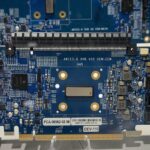Samsung’s Revolutionary NAND Chip Set to Redefine Storage Industry
The storage technology landscape is about to witness a major upheaval as Samsung gears up to launch a groundbreaking new storage chip. This cutting-edge 430-layer NAND chip is set to pave the way for 100TB SSDs to become a mainstream reality, catapulting Samsung ahead of its competitors in the fierce race for NAND dominance.
Since 2002, Samsung has been a top player in NAND-based storage devices. However, competitors have been catching up rapidly. Samsung’s latest move involves the mass production of its innovative 290-layer ninth-generation vertical (V9) NAND chips. These advanced chips, incorporating Samsung’s double-stack technology, are strategically designed for AI, cloud devices, and large-scale enterprise servers.
While Samsung continues to lead the way, other industry giants are not far behind. SK Hynix, the world’s second-largest memory chipmaker and Samsung’s formidable rival, is on track to introduce its own 321-layer NAND technology next year. Similarly, Chinese flash memory specialist Yangtze Memory Technologies is gearing up to unveil its 300-layer chips in the near future, adding to the intensifying competition in the market.
The Race for NAND Supremacy
In a bid to maintain its lead, Samsung is not resting on its laurels. Industry insiders have hinted at the upcoming launch of a groundbreaking 430-layer tenth-generation (V10) NAND chip next year. Notably, this next-gen chip will leverage Samsung’s triple-stack technology, signaling a significant milestone in the ongoing technological advancements in the storage sector.
The escalating competition for NAND dominance comes amidst the surging demand for high-performance and high-capacity storage solutions in the era of artificial intelligence. The advent of high-density NAND chips not only meets this growing demand but also enhances the capabilities of 5G smartphones, reflecting the dynamic nature of the industry and its responsiveness to evolving consumer needs.
According to reports from The Korea Economic Daily, major chip manufacturers are embroiled in an intense race to develop cutting-edge chip stacking technology to drive down costs and enhance performance. Samsung has already set its sights on developing over 1,000-layer NAND chips by 2030, underlining its commitment to pushing the boundaries of innovation in the storage technology realm.











